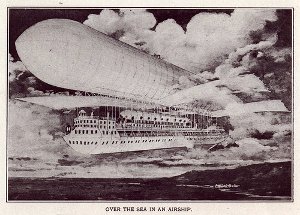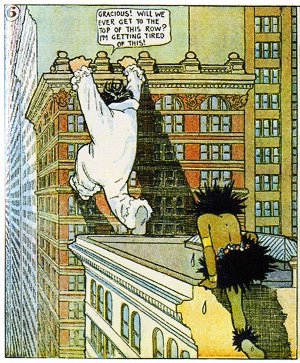
Icebergs? Bah! We’re not afraid of any silly icebergs!
I know Mr Jung and Mr Freud tell us that we can learn things from our dreams. Well, last night I learned that zeppelin crews on the Rio to Lisbon route steal shoes from the passengers’ staterooms when they get bored. (Brawls have broken out over a pair of Spongebob flip-flops.)
I learned further that if you lose your wallet during the trip you are handed over to my friend Judith Levine for safe keeping — although her response is usually just to throw up her hands, cry “Whatever!”, and sail out in a flurry of crêpe de Chine. The trip takes three days.
It was quite a dream, even for me.
For centuries, people blamed spicy food for exotic or unusual dreams: in 1904, Winsor McCay began a comic strip for the New Evening Telegram called “Dream of the Rarebit Fiend” in which the central characters’ bizarre dreams were caused by a late meal of “welsh rarebit“, a dish of toast with mustard-and-Worcestershire-seasoned cheese sauce. Giants romping through New York City, people experiencing their own funerals… It was a pretty kaleidoscopic experience, generally, and a lot to blame on a couple of pieces of cheese toast.
In 1905, Winsor McCay began the strip for which he is best known, “Little Nemo in Slumberland”, which, while certainly loopy, was a toned down considerably from its predecessor in order to appeal to a more general audience. He is also known for one of the earliest animated shorts, “Gertie the Dinosaur”, from 1914.

Little Nemo, romping through dreamland in his footie PJ’s.
My dinner last night centered around roasted brussels sprouts, a baked potato, and tuna steak, so I don’t think I can fall back on the welsh-rarebit defense.
Another highlight from last night’s extravaganza? I learned that my extensive study of Renaissance painting on biblical themes made me the only person on the zeppelin crew who could spell “Massacre of the Innocents” correctly for a sign we needed to create. (In their defence, many of the other crew members spoke primarily Portuguese, so perhaps there was a language issue.) I don’t recall that we were actually planning to massacre any innocents, but I have no memory as to the purpose for which the sign really was intended.
I’ve written about dreams in this blog before (last June, in “Dream a Little Dream“), but this morning I don’t think I’m quite up to a scholarly disquisition. I’m just giving you the particulars, and leaving you to draw your own conclusions.
The control room of this trans-Atlantic behemoth (it was an airborne cruise ship) looked a lot like a laundromat, as all of the zeppelin’s controls were housed in white boxes with knobs and dials, with the occasional large lever alongside — you know the kind, the one that sticks up three or four feet from the floor in spaceships from 1950’s science fiction movies, and never works when you need it to. Once over the ocean, there was little for the crew to do, so we spent much of our time devising ways to amuse ourselves, such as playing shuffleboard in the hallways and mixing up passengers’ laundry.
The “Infinite Monkey Theorem” of 1913-14 states that a monkey hammering away at a keyboard for an infinite length of time will, at some point, purely by accident, manage to place the right letters in the right sequence and recreate “Romeo and Juliet” in its entirety. I sometimes wonder if the human brain works in a similar way — if you tumble enough random bits and pieces around in there for long enough, perhaps it’s inevitable that you will one night produce a dream in which a zeppelin crewmember, while mopping the floor in an outside walkway, will stumble upon a Hello Kitty pocketbook filled with #8 finishing nails.
I should mention that I am prone to somewhat cinematic dreams, and I rather enjoy them. Like stumbling across a box in your mother’s attic, filled with artifacts of your childhood that you had forgotten existed, sometimes wild dreams help to stir up memory, and bring old knowledge into new focus, or throw everyday events into bizarre and unexpected juxtapositions, like the “chance meeting on a dissecting-table of a sewing-machine and an umbrella” of the Comte de Lautréamont, in his Chants de Maldoror.
Did you know that the if no one pays any attention to the large molded-plastic warning signs that hang above the debarkation escalator, the lettering gradually melts back into the surface and fades away? Yep. It happens on the Rio to Lisbon zeppelin. I saw it.
* * *



Leave a Reply